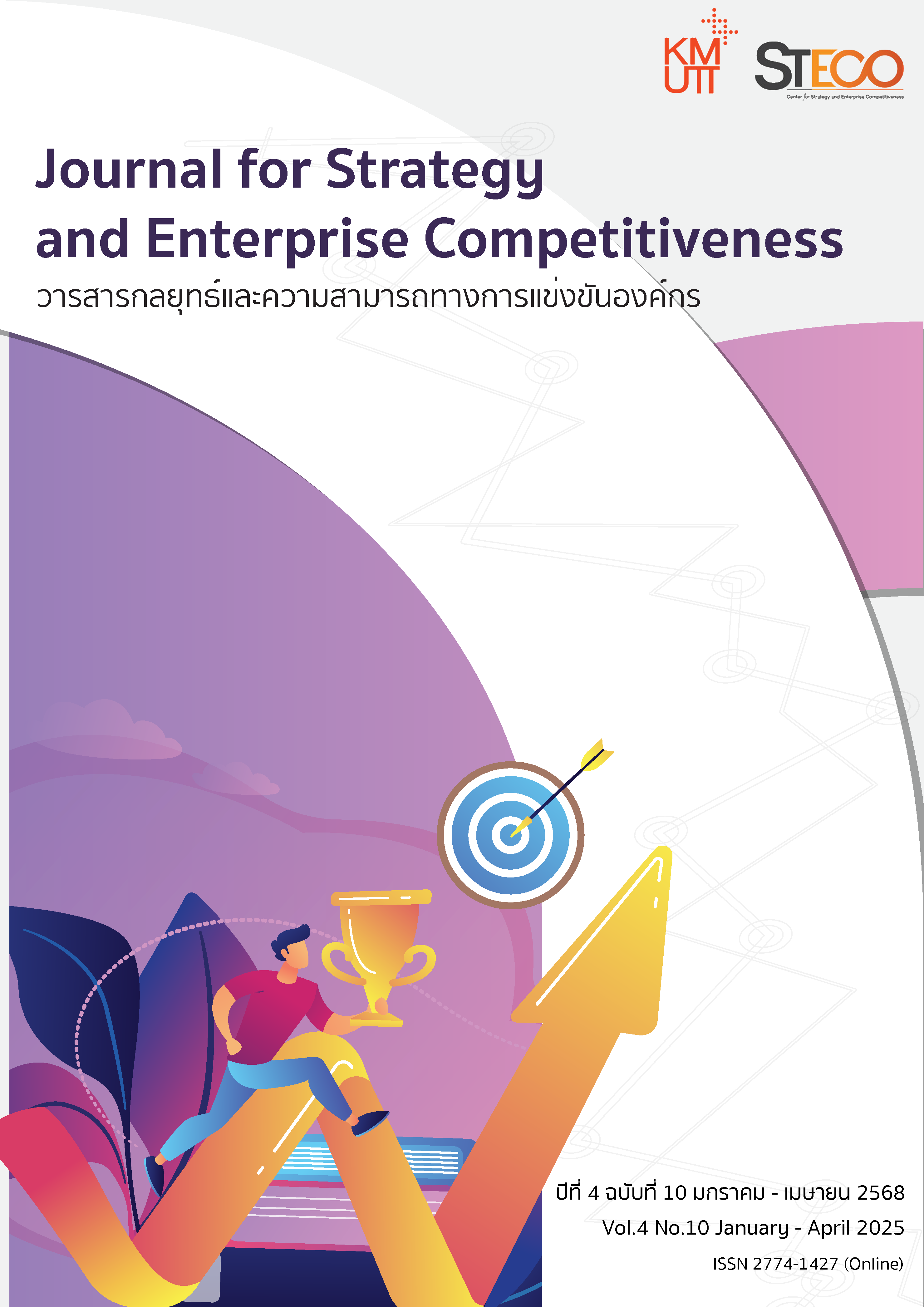การศึกษาปัจจัยที่มีอิทธิพลต่อการพัฒนาความสามารถทางการเงินดิจิทัล ของผู้ประกอบการรายย่อย: กรณีศึกษาสินเชื่อออนไลน์
คำสำคัญ:
การเงินดิจิทัล, ทักษะการเงินดิจิทัล, ผู้ประกอบการรายย่อย, แรงจูงใจ, การเปลี่ยนแปลงพฤติกรรมบทคัดย่อ
การศึกษานี้มุ่งเน้นการพัฒนาความสามารถด้านการเงินดิจิทัลในกลุ่มผู้ประกอบการรายย่อยในประเทศกำลังพัฒนา ซึ่งได้รับอิทธิพลจากการเติบโตของบริการการเงินดิจิทัลในช่วงการระบาดของ COVID-19 ที่ส่งผลให้การทำธุรกรรมทางการเงินผ่านแอปพลิเคชันสินเชื่อออนไลน์เพิ่มสูงขึ้น การวิจัยนี้ใช้กรอบแนวคิดจากทฤษฎีการเปลี่ยนแปลงพฤติกรรมและแบบจำลอง I-change เพื่อตรวจสอบปัจจัยที่มีอิทธิพลต่อการพัฒนาทักษะทางการเงินดิจิทัล โดยเน้นที่ความรู้ทางการเงินดิจิทัล ทัศนคติ และการเห็นคุณค่าในตนเอง การศึกษานี้มุ่งเน้นการพัฒนาความสามารถด้านการเงินดิจิทัลในกลุ่มผู้ประกอบการรายย่อย จำนวน 400 คน จากกรุงเทพและปริมณฑล ซึ่งได้รับอิทธิพลจากการเติบโตของบริการการเงินดิจิทัลในช่วงการระบาดของ COVID-19 ที่ส่งผลให้การทำธุรกรรมทางการเงินผ่านแอปพลิเคชันสินเชื่อออนไลน์เพิ่มสูงขึ้น การวิจัยนี้ใช้กรอบแนวคิดจากทฤษฎีการเปลี่ยนแปลงพฤติกรรมและแบบจำลอง I-change เพื่อตรวจสอบปัจจัยที่มีอิทธิพลต่อการพัฒนาทักษะทางการเงินดิจิทัล โดยเน้นที่ความรู้ทางการเงินดิจิทัล ทัศนคติ และการเห็นคุณค่าในตนเอง ผลการวิเคราะห์โดยใช้แบบจำลองโครงสร้างเชิงสมการ (SEM) และการวิเคราะห์เส้นทาง (Path Analysis) พบว่า ความรู้และแรงจูงใจมีความสัมพันธ์กันอย่างมีนัยสำคัญทางสถิติ โดยส่งผลเชิงบวกต่อทักษะและความสามารถทางการเงินดิจิทัลของผู้ประกอบการรายย่อย พบว่า ความรู้และแรงจูงใจมีความสัมพันธ์กันอย่างมีนัยสำคัญ โดยส่งผลเชิงบวกต่อทักษะและความสามารถทางการเงินดิจิทัลของผู้ประกอบการ ทั้งนี้ ทัศนคติและความมั่นใจในตนเองของผู้ประกอบการมีส่วนสำคัญในการสร้างพฤติกรรมใหม่ที่สนับสนุนการใช้บริการสินเชื่อออนไลน์อย่างมั่นใจ รวมถึงกระบวนการเตรียมความพร้อมและการฝึกอบรมที่เหมาะสม ข้อเสนอจากการวิจัยนี้เน้นถึงความสำคัญของการพัฒนาหลักสูตรสร้างแรงจูงใจและการสนับสนุนจากภาครัฐ เพื่อเพิ่มโอกาสการเข้าถึงบริการการเงินดิจิทัลสำหรับผู้ประกอบการรายย่อยอย่างยั่งยืน
เอกสารอ้างอิง
Aastha, S. (2024). Digital technology improving financial inclusion in India: Post Covid evidence. Asian Journal of Economics, Business and Accounting.
Albornoz-Arias, N., & Santafé-Rojas, A. K. (2022). Self-confidence of Venezuelan migrant entrepreneurs in Colombia. Advances in the Social Sciences.
Anderson, S. G., Zhan, M., & Scott, J. (2004). Targeting Financial Management Training at Low-Income Audiences. Journal of Consumer Affairs, 38(2), 167-177. https://doi.org/10.1111/j.1745-6606.2004.tb00470.x
Baliawan, P. R., Latifah, P., & Herdiany, D. H. (2024). Analysis of the influence of self-efficacy, perceived ease to use, perceived benefits, and perceived risk on intention to use digital payment applications in Yogyakarta. Business Management and Analysis Journal, 7(1), 64-82.
Bandura, A. (1986). Social foundations of thought and action: A social cognitive theory. Prentice-Hall.
Bank of Thailand. (2023). Annual report on digital financial services usage among micro- entrepreneurs. Retrieved from https://www.bot.or.th
Bloom, B. S. (1956). Taxonomy of educational objectives, handbook I: The cognitive domain. David McKay Company.
Caleb, O. (2023). The role of attitude in the unified theory of acceptance and use of technology: A meta-analytic structural equation modelling study. International Journal of Technology in Education and Science.
Chang, Liu. (2022). 4. Applying Diffusion Model to Analyzing Stimulating Activities for Positive Attitude Platform. https://doi.org/10.1109/IMCEC55388.2022.10019993
Chen, Y., & Zhang, S. (2021). Digital financial literacy in developing economies: Barriers and opportunities for small enterprises. Journal of Financial Development, 14(2), 123-135.
Jose, J., & Ghosh, N. (2024). Digital financial literacy and its impact on financial behaviors. Advances in Finance, Accounting, and Economics Book Series.
Jiang, L., & Li, M. (2023). The impact of digital financial knowledge on confidence and security in online loan transactions: A study on small businesses. International Journal of Digital Finance, 7(1), 78-92.
Mongkolsuthree, M., et al. (2022). Financial literacy in the digital age: A case study of SMEs and online loans in Thailand. Asia-Pacific Journal of Business Innovation, 9(3), 256-269.
Or, C. (2023). The role of attitude in the unified theory of acceptance and use of technology: A meta-analytic structural equation modelling study. International Journal of Technology in Education and Science, 7(4), 552-570.
Prochaska, J. O., DiClemente, C. C., & Norcross, J. C. (1992). In search of how people change: Applications to addictive behaviors. American Psychologist, 47(9), 1102-1114. https://doi.org/10.1037/10248-026
Prykaziuk, N., & Khodakivska, O. (2023). Curriculum design for essential financial skills: Interest calculation, loan application tools, and risk prevention strategies. In Proceedings of the International Conference on Financial Education (pp. 78-92).
Ramachandran, N., & Al Hajri, A. (2024). Adoption of digital banking services: Detection of frauds and preventive action by banks. Advances in Finance, Accounting, and Economics Book Series.
Steven, G., Anderson., Min, Zhan., Jeff, Scott. (2004). 2. Targeting Financial Management Training at Low-Income Audiences. Journal of Consumer Affairs. https://doi.org/10.1111/J.1745-6606.2004.TB00470.X
Turner, M., Sermcheep, S., Anantasirijkiat, S., & Srisangnam, P. (2016). Small and medium-sized enterprises in Thailand: Government policy and economic development. The Asia Pacific Journal of Public Administration.
Yadav, O. P., Teotia, R., & Baliyan, R. (2024). Fintech and Data Science. 332–349. https://doi.org/10.1201/9781032720104-21
Yang, J., Wu, Y., & Huang, B. (2023). Digital finance and financial literacy: Evidence from Chinese households. Journal of Banking and Finance. https://doi.org/10.1016/j.jbankfin.2023.107005
Yi, Zhang. (2021). 1. The Design of a Mobile App to Promote Young People’s Digital Financial Literacy. https://doi.org/10.1007/978-3-030-78227-6_10.
Umar, H. U., Baita, J. A., & Muhamad, A. A. (2024). Digital finance and SME financial inclusion in Africa. African Journal of Economic and Management Studies.
Zhao, W. (2021). The role of digital finance in supporting small business during the pandemic. Digital Economics Review, 10(4), 45-60.

ดาวน์โหลด
เผยแพร่แล้ว
รูปแบบการอ้างอิง
ฉบับ
ประเภทบทความ
สัญญาอนุญาต
ลิขสิทธิ์ (c) 2025 วารสารกลยุทธ์และความสามารถทางการแข่งขันองค์กร

อนุญาตภายใต้เงื่อนไข Creative Commons Attribution-NonCommercial-NoDerivatives 4.0 International License.
ข้อคิดเห็นที่ปรากฏและแสดงในเนื้อหาบทความต่าง ๆ ในวารสารกลยุทธ์และความสามารถทางการแข่งขันองค์กร ถือเป็นความเห็นและความรับผิดชอบโดยตรงของผู้เขียนบทความนั้น ๆ มิใช่เป็นความเห็นและความรับผิดชอบใด ๆ ของศูนย์กลยุทธ์และความสามารถทางการแข่งขันองค์กร มหาวิทยาลัยเทคโนโลยีพระจอมเกล้าธนบุรี
บทความ ข้อมูล เนื้อหา และรูปภาพ ฯลฯ ในวารสารกลยุทธ์และความสามารถทางการแข่งขันองค์กร ถือเป็นลิขสิทธิ์เฉพาะของศูนย์กลยุทธ์และความสามารถทางการแข่งขันองค์กร มหาวิทยาลัยเทคโนโลยีพระจอมเกล้าธนบุรี หากบุคคลหรือหน่วยงานใดต้องการนำทั้งหมดหรือส่วนหนึ่งส่วนใดไปเผยแพร่ต่อหรือเพื่อกระทำการใด ๆ จะต้องได้รับอนุญาตเป็นลายลักษณ์อักษรจากศูนย์กลยุทธ์และความสามารถทางการแข่งขันองค์กร มหาวิทยาลัยเทคโนโลยีพระจอมเกล้าธนบุรีก่อนเท่านั้น


